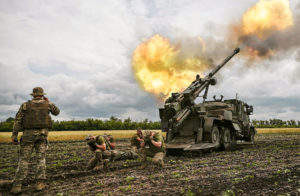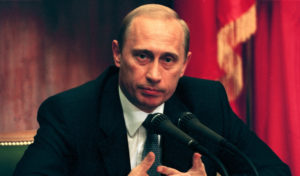Ukrainian forces have recently retaken much of the ground that was captured by Russia in the first months of this year, and the Russian government and military response has looked increasingly panicked. Hundreds of thousands of civilian men have been drafted, with large numbers fleeing the country to avoid conscription, and dozens of cruise missiles fired at civilian targets in Ukrainian cities, killing at least 11 people.
Most alarmingly, perhaps, Vladimir Putin has discussed the possibility of using nuclear weapons and his subordinate, the Chechen leader Ramzan Kadyrov, has called for the use of a “tactical” nuclear weapon on the battlefield in Ukraine. We wanted to assess how likely it is that a nuclear bomb might be used in the war. As well as that, what factors might increase the chance of that happening — if Ukraine continues to retake territory, or if Putin begins to lose his grip on power, will that increase or reduce the likelihood of a nuclear attack? Our forecasters were asked:
Will a nuclear weapon be detonated in Europe as an act of hostility before 30 April 2023?
Median forecast: 9%
That’s an extraordinarily high risk for a (just-over)-six-month period — if that level of danger was constant, there would be less than 20% chance of making it through any given decade without a nuclear explosion. The likelihood that the 75 years since the Second World War would have passed without any atomic bombs going off would be minuscule. But that group’s forecast hides a reasonable amount of variation. Some felt it was as low as 5%; others as high as 20%.
Forecasters were asked several questions about possible milestones in the war, such as Ukraine taking a particular city or region. How likely are those milestones, and if they happen, what will they say about the risk of a nuclear detonation? We asked four pairs of questions about the possible fall of four different cities: Sievierodonetsk, Melitopol, Chaplynka, and Mariupol. For each, we asked:
What is the probability that Ukraine’s armed forces will take control of the city before 1 April 2023?
If Ukraine’s armed forces do take control of the city before 1 April 2023, will a nuclear weapon be detonated in Europe as an act of hostility within the following 30 days?
If the risk of a nuclear weapon being detonated between now and 30 April 2023 is uniform over time, then our 9% forecast implies there is a rolling risk of 1.3% over a 30-day period for the foreseeable future. Here, we use 1.3% as our benchmark for examining the effect of each milestone.
All the forecasters felt that more cities were likely to return to Ukrainian hands. The aggregate forecast was 71% that Sievierodonetsk, just a few miles behind the Russian lines, would fall. One forecaster felt that its loss was “already factored in” to Russian military thinking. Melitopol, in the south-east, and Chaplynka, on the border of the Crimean peninsula in the south, were almost as likely — 48% and 44% likely, respectively.
Sievierodonetsk is a “test” of the risk of nuclear weapons, said one forecaster — it is likely to fall soon, and tactical nuclear weapons could easily be targeted at Ukrainian supply lines, and be used in a comparatively low-stakes way. But another felt that “if Russia was going to use nuclear weapons because of Sievierodonetsk, they probably should have already”. The likelihood of a nuclear weapon being detonated in Europe in the 30 days following the recapture of Sievierodonetsk, Melitopol, and Chaplynka is 3.3%, 5.1%, and 5.5% according to our forecasters. The implication here — with its risk elevated up to four times higher than our baseline monthly figure — is that a nuclear exchange is more likely to occur following exchanges in territorial control.
Mariupol, on the other hand, deep behind Russian lines and symbolically important after its long resistance, was deemed unlikely to fall, with an aggregate estimate of 21%. “In this case, it seems likely that the whole Russian lines have collapsed”, wrote one forecaster. “If Mariupol is taken, it probably means the war is completely lost for Russia, with the possible exception of Crimea”, wrote another.
Most of the forecasters felt that, if nuclear weapons were to be used, it would happen before Mariupol fell: “If they haven’t been used prior to this event, then I highly doubt this would be the turning point”, said one, although another sounded a note of caution: “If Mariupol is re-taken, it would be a devastating blow to Putin, so the risk of a hostile nuclear detonation after the re-capture of Mariupol wouldn’t be entirely eliminated.” Accordingly, if this takes place, our forecasters assign a 1.6% chance of a nuclear weapon being used over the subsequent 30 days — similar to our baseline rolling risk.
Forecasters were also asked two pairs of questions about wider regions, the oblasts of Donetsk, Luhansk, Kherson, and Zaporizhia:
Will Russia be completely driven from Donetsk and Luhansk oblasts before 1 April 2023?
Will Russia lose all of Kherson and Zaporizhia oblasts before 1 April 2023?
What effect would the realisation of these scenarios have on the chance of a nuclear attack over the subsequent 30 days?
Driving Russia entirely out of the Kherson and Zaporizhia oblasts, in the south of Ukraine, seemed unlikely to most forecasters — with an aggregate forecast of 31% — but it would be a major humiliation if they were. “If Zaporizhia and Kherson fall, Putin is also likely to have few days left,” wrote one. “His troops would be thoroughly demoralised. I would suspect that he would want to make a desperate last stand at the border of Crimea.”
Whether it would increase the risk of nuclear weapons was unclear. “Again, this comes well after the point at which a tactical nuclear weapon ought to be used,” wrote one, although another felt that one might still be used “to deter any further Ukrainian gains in the (more important to Russia) territories of the Donbas and Crimea”. The aggregate forecast of the probability of a nuclear attack in the following month was 3.2%.
The loss of Donetsk and Luhansk oblasts — in the east of Ukraine, bordering Russia, filled with Russian-speaking ethnic Russians, and the parts that Russia initially occupied in February — would be especially damaging to Russia’s self-image. “The loss of them would be catastrophic for Putin,” wrote one forecaster, “because it would signal that he could not even hold territory where many of the locals may not oppose his forces”.
Again, though, it was considered unlikely that both oblasts would be recaptured by Ukraine in the next six months, forecasted to be 18% likely. The risk of nuclear weapon usage 30 days after the realisation of this condition, 1.2%, was deemed to be lower than the baseline risk of 1.3%. “By this point”, according to one forecaster, “Russia will have essentially lost the war, and would have no incentive to launch a nuclear weapon.”
Turning toward the leadership of the countries directly involved in the conflict, we asked the forecasters whether either Vladimir Putin or Volodomyr Zelenskyy leaving office would affect the chance of a nuclear attack.
The chance of Zelenskyy leaving office was considered low — 5%, — without much variance. The only plausible reason the forecasters thought he would leave was if he was killed. If he was killed by a nuclear blast, that might make a second attack more likely, but in general it wasn’t thought that it would increase the risk: “If Zelenskyy dies then everything is up in the air,” said one. “Seems Putin no longer needs to resort to nuclear weapons.”
The chance of Putin leaving office, on the other hand, was thought to be higher — 10.5% — and with much greater variance, with one forecaster as high as 38%. If he leaves, it will not be in triumph. “If Vladimir Putin leaves office, it is likely due to a massive and humiliating defeat in Ukraine,” said one forecaster. It would also mean, they felt, that a nuclear detonation would be less likely. “The cases where Putin leaves office will almost universally involve the invasion being regarded as a complete failure,” said one, “and any replacement is almost certainly not going to escalate it”. They put the chance of a nuclear strike in the month after Putin leaves office at 2%.
A more complex scenario is one in which Putin faces a coup attempt. Forecasters were asked:
Will there be an attempted coup to remove Putin resulting in more than five arrests before 1 April 2023?
The forecasters again thought this to be unlikely but not vanishingly so: 15% (with significant variation — one put it at 33%). But they were unsure about whether it would raise or lower the risk of a nuclear blast: some felt it would make Putin edgy; others felt it would make him less willing to do anything that would further undermine his standing, such as starting a nuclear war.
While the forecasters considered a broad range of factors that affect escalatory scenarios (from Russian military doctrine to the chance of nuclear launch orders being disobeyed), we have not identified any highly probable scenarios that turn the possibility of nuclear escalation into an inevitability. However, our forecasters clearly associate major losses in Russian-controlled territory with a higher chance of nuclear escalation. Ukrainian recapture of cities in the Kherson and Zaporizhia Oblasts, for instance, may coincide with increasingly desperate responses from Russia.
It’s important to note that this is only forecasting the chance of at least one bomb going off, somewhere in Europe. The obvious follow-up question would be: if one does, what are the likely outcomes? Will it lead to reprisals by NATO and the West on Russia? If so, will they be conventional or nuclear?
***
A version of this research first appeared on the Swift Centre.
Disclaimer
Some of the posts we share are controversial and we do not necessarily agree with them in the whole extend. Sometimes we agree with the content or part of it but we do not agree with the narration or language. Nevertheless we find them somehow interesting, valuable and/or informative or we share them, because we strongly believe in freedom of speech, free press and journalism. We strongly encourage you to have a critical approach to all the content, do your own research and analysis to build your own opinion.
We would be glad to have your feedback.
Source: UnHerd Read the original article here: https://unherd.com/





